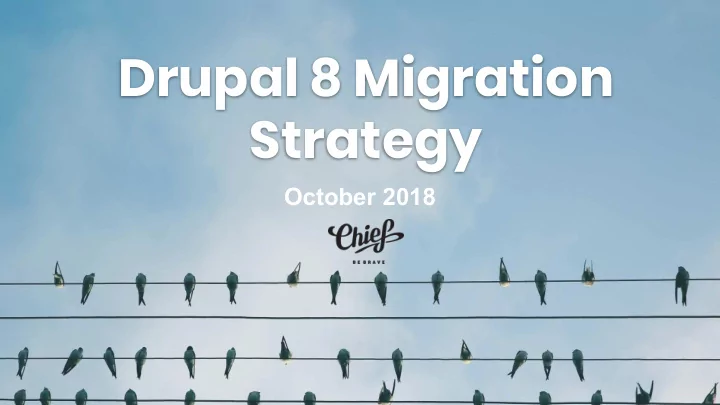

Drupal 8 Migration Strategy October 2018
Lynne Walsh Senior Technical Content Strategist, CHIEF lynne.walsh@agencychief.com
Where to Start Inventory
Number of: ● urls (how many pages) What is an ● taxonomy terms (how they are organized) inventory? ● site directories (how many site sections there are) Like an inventory of a library, an inventory of a website includes: ● user accounts (who’s updating the site) ● f iles and assets (pdfs, images, video etc.)
Anything your developer needs to move from one place to another should be in your inventory.
Compiling Your Inventory Database Site Crawl Get a copy of your database Run a site crawl using and pull counts for: automated site crawler to count: ● Content Types ● Nodes ● Directories ● Taxonomy ● File links ● Images ● Users *Don’t forget to compare your results to look for Orphan Pages
Map It
Take it By Type
Mapping Spreadsheets
You don’t need to be a developer to put this spreadsheet together. You just need to know where to look.
Where to Look
Migration Types
2 Types of Migration / 4 Types of Sources Scripted Migration Manual Migration 1 3 4 Database to CSV to Database Good ol’ Database Copy & Paste 2 API to Database
Scripted Migration Move data from one database into 1 Database to another, Database using coded files that direct where the data should go and how . 2 *can also be applied to API migrations *API to Database
Scripted Migration Move data from a CSV into a database, 3 using coded files that direct CSV to Database where the data should go and how .
Manual Migration Move data by hand . Copy and Paste , 4 directly into the wysiwyg Good ol’ Copy & Paste in the new site.
Database to Database (scripted) How to Choose? Manual CSV to (good ol’ Database copy and (scripted) paste)
One Section For Each Content at a Time Type... To determine how to 1. List your fields approach a migration, take 2. Map those fields it content type by 3. Decide Method content type.
Examples Blog content types typically have: Page content types typically have: ● Consistent fields; ● Small amount of content; ● Consistent functionality; ● Varying layout; ● High number of nodes. ● Varying functionality. Therefore, the fastest option is Therefore, the best option is to scripting the blog content type. migrate page content by hand .
Resourcing Think about your team.
Consider The • Developer Heavy and limited strategist support. Consider scripting. Players • Developer support is present but limited. Rely on your Who is on your Team? strategists to manually migrate so your dev can spend their time where they are needed most. • Diverse Team. Lots of strategists, copy editors, UX, and developers. Consider splitting work up between people to divide and conquer.
Consider the Rate How fast can your team manually migrate.
Recycle Your Code Scripts are written field by field and this code can be reused. Talk to your developers about the code they’ve used before and avoid having to start from scratch.
• Types of fields in each content Talk to Your type. Plain text vs. formatted text (like a WYSIWYG). Developer • Make sure there is a migration plan for any unique functionality (calendars, video, php code, Run through the results of the things brought in via iframe). inventory & make note of the following: • How taxonomy used on the site.
Helpful Resources ● Migration Mapping Spreadsheet ● Screaming Frog site crawler ● Blog: Migration Strategy: Using Your Inventory *ongoing blog series on migration Let’s Connect!
Questions?
Recommend
More recommend